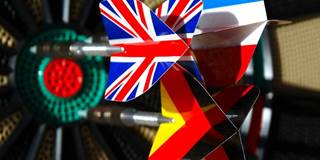In the last two years, Germany has adopted leadership roles regarding the conflict in Ukraine, the civil war in Syria, and the refugee crisis. While this is a welcome development, German leaders must bear in mind that their country's EU membership remains its most potent source of power.
BERLIN – In the two years since Germany’s president, foreign minister, and defense minister signaled that their country would take on a larger role in international affairs, the country’s leaders have received a crash course in geopolitical realism. The challenges Germany has had to face include Russia’s annexation of Crimea, the conflict in eastern Ukraine, the explosion of Syria, terrorist attacks in Europe, and an unprecedented influx of refugees.

BERLIN – In the two years since Germany’s president, foreign minister, and defense minister signaled that their country would take on a larger role in international affairs, the country’s leaders have received a crash course in geopolitical realism. The challenges Germany has had to face include Russia’s annexation of Crimea, the conflict in eastern Ukraine, the explosion of Syria, terrorist attacks in Europe, and an unprecedented influx of refugees.